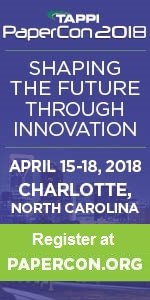| |
 · www.tappi.org
· www.tappi.org
· Subscribe
to Ahead of the Curve
· Newsletters
· Ahead
of the Curve archived issues
· Contact
the Editor

|
|
|
|
Prize funds research into cellulose-based aerogels
As reported by RISE Bioeconomy (innventia.com), Fernando Alvarado, a researcher at RISE Bioeconomy, has been awarded this year's Skills Prize from the Gunnar Sundblad Research Foundation. The award of SEK 500,000 (about US$59,600) will be used to initiate a Swedish research platform for cellulose-based aerogel particles that can, among other things, replace traditional absorbents, thickeners and microplastics. The prize will be awarded by HMK Carl XVI Gustaf on April 17, 2018, during the Forestry Week in Stockholm.
Fernando Alvarado is a PhD in Wood Chemistry and researcher in the field of new products from forest raw materials, products that could replace many of today's fossil-based materials. The type of products related to this year's Skills Prize is aerogels.

Researcher Fernando Alvarado is working to develop cellulose-based aerogel particles.
Aerogels are porous materials with low density. To illustrate this, one can imagine a brick weighing 1 gram, or a lump of sugar capable of carrying a 6 or 8 pound stone without breaking apart. The materials are usually made of silicon, carbon, or metal oxides. There are also organic aerogels made of fossil raw material. New research results from RISE now show that aerogel particles could be made of cellulose from renewable forest raw materials.
The applications are many. They can be used as carrier of fertilizers and medicinal preparations for controlled secretion, or as thickeners in foods where the aerogel also acts as a capture for radicals during the digestive process. Another interesting area is adsorption of moisture and heavy metals.
"In a current EU project (Nanohybrids), we have studied the moisture absorption of cellulose-based aerogels for use in dishwashers. The result is fascinating. Our aerogels have an absorption capacity of 120 percent, where other materials reach between 10 and 30 percent," says Alvarado.
Cellulose-based aerogels also have the potential to replace microplastics in products such as cosmetics and hygiene items. Microplastics represent a serious problem in the oceans.
"With renewable raw materials that are biodegradable and non-toxic, cellulose-based aerogels would thus be of great environmental importance," Alvarado says.
Manufacturing could create new product opportunities in large volumes for the forest industry, but in order for it to become reality, increased understanding and knowledge is required. The Skills Prize enables initiation of a research platform in Sweden, which provides a basic understanding of the production, properties and applications of cellulose-based aerogels.
"My ambition is to associate professors in Europe with complementary skills to the research network and create conditions for securing future skills in RISE with new young researchers," says Alvarado.
'Smart' filters to clean water and air
In related research, three separate divisions of RISE—Bioeconomy, ICT and Bio-sciences and materials—are involved in a Mistra-funded TerraClean research program that will lead to new sustainable and efficient purification systems. Within the program, scientists collaborate from a variety of areas to create cheap, sustainable, safe, and smart materials for integrated filter systems to interactively clean air and water from environmentally hazardous substances.
Researcher Hjalmar Granberg describes why RISE Bioeconomy participates in the project. "In many applications the aim is a large area. For this purpose, we believe that aerogels, which are a kind of freeze dried foam, of cellulose would be a solution for producing wet stable porous filters."
But cellulose in water—does it really work?
"Together with KTH Royal Institute of Technology, we have developed a new process for making wet-stable aerogels, i.e. they are not dissolved in water. The aerogels have a structure that allows it to be decorated on the inside and thus we have thought of integrating chemistry, electronics and optics," Granberg says.
In addition to aerogels, RISE Bioeconomy will also, together with RISE ICT, develop zinc oxide paper for water and air purification. The work is based on earlier successful attempts at RISE pilot paper machine FEX.
"When a paper containing zinc oxide is exposed to UV light it becomes conductive. This means that the electronic properties of the paper are interactive and can be controlled with a UV lamp. By getting the sunlight to illuminate the zinc oxide near the particles we could get the paper to act as a photocatalytic cleaner," says Granberg.
Zinc oxide paper as well as aerogels are included in the RISE Bioeconomy initiative on biobased electronics—nicknamed "BioEl"—to meet the future needs of functional materials in a biobased circular economy. The materials can be used for a variety of applications from energy storage of renewable energy, water and air purification to the interface between analogue reality and digital features that are of great value to the "Internet of Things."
RISE Bioeconomy is part of the RISE institutes—Innventia, SP, and Swedish ICT—which have merged in order to become a stronger research and innovation partner. By collaborating with academia, industry and the public sector, RISE enables a competitive business environment and contributes to a sustainable society. RISE Bioeconomy comprises the units Biorefinery and Energy, Papermaking and Packaging, and Biobased Materials together with these separate companies: RISE PFI, RISE Processum, RISE ETC, RISE LignoDemo, and RISE UK. RISE is fully owned by the Swedish Government.
For more news about developments at RISE, visit www.inventia.com.
For a modest investment of $174, receive more than US$ 1000 in benefits in return.
Visit www.tappi.org/join for more details. |
|




